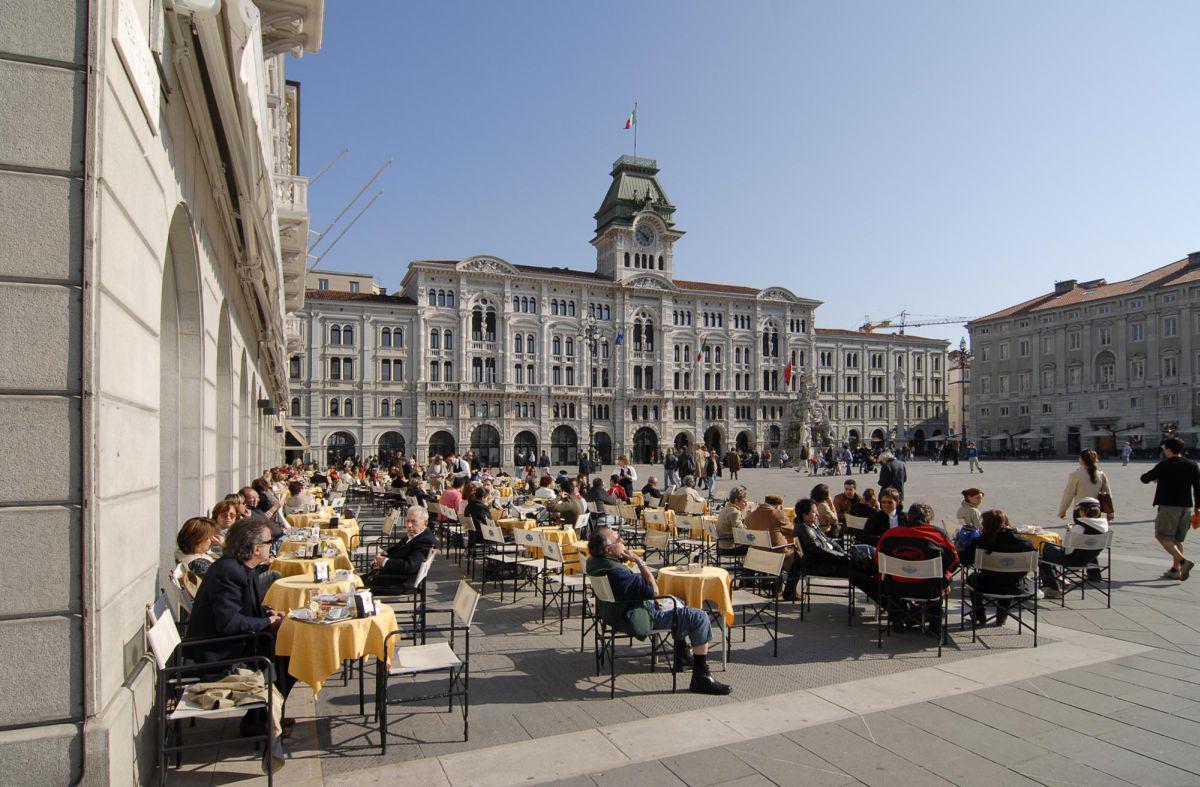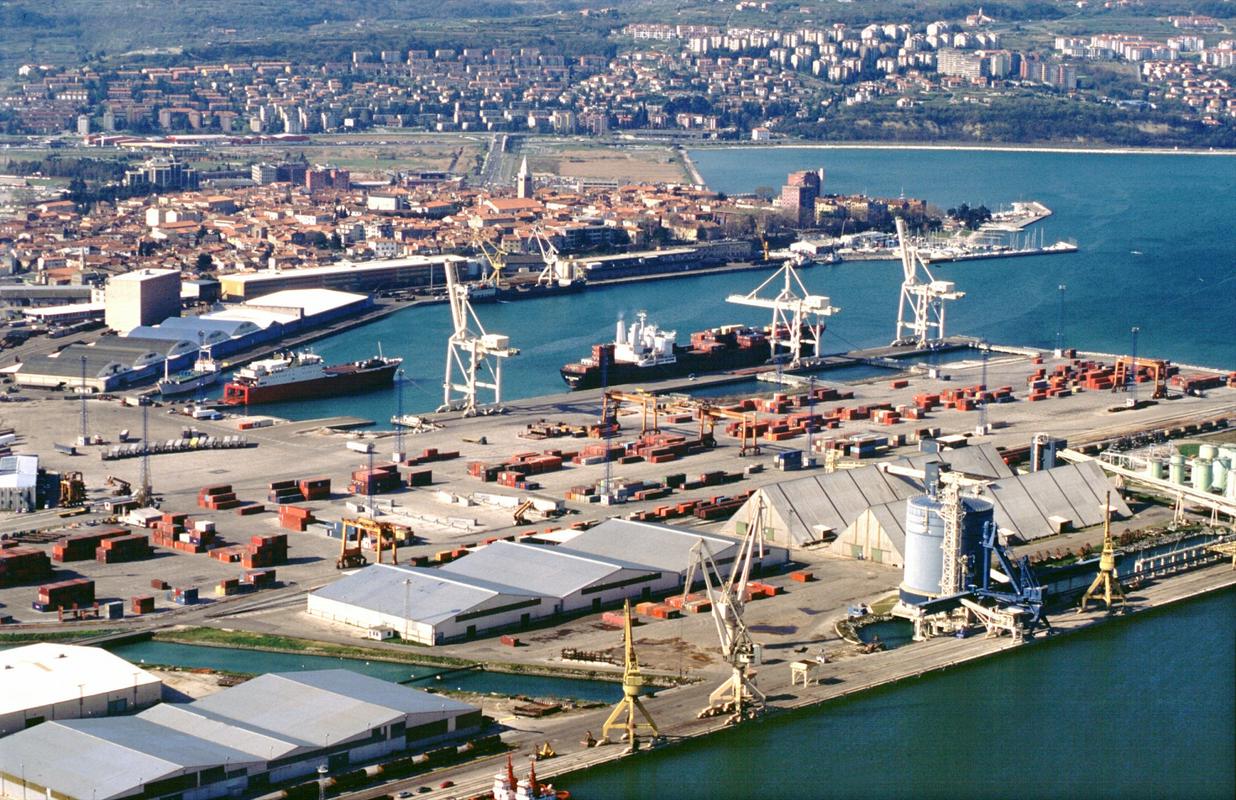

Being aware of this part of history is especially important during current discussions on the maritime status of Slovenia.
Among cities that are often mentioned in discussions on Slovenian maritime directions, the crucial role is played by Trieste. This city was strategically very important for the Slovenian politics already in the time of the Habsburg Monarchy – before the First World War it was home to more Slovenians than Ljubljana. With the end of the Habsburg Monarchy, Slovenia lost its connections to Trieste, as the Entente Powers assigned it to Italy, together with the Slovene Littoral, by signing the Treaty of London in 1915. At the end of the World War II, Yugoslavia lost its chances to join Trieste and thus Koper assumed the role of Slovenia's maritime connection with the world. The first Slovenian maritime company – Val – was established in 1954; it was later renamed to Slovenija linije and is today known under the name Splošna plovba. In 1957 Luka Koper (Port of Koper) was founded, which evolved into an important port in the North Adriatic.
Development of economy and science
Danilo Petrinja was the founder of the Port of Koper and its director for a decade. He was the type of economist who could achieve a lot despite the fact that he did not have a university education. Many of his contemporaries agree that without him, the Port of Koper would not exist today. At that time, the development of the port was depending on faster connections to the hinterland, especially by building railways. In the following years, he remained active and participated in discussions on the development of the coast. He claimed: "Koper must and can create conditions for the development of an industrial zone." Mr Petrinja was aware, perhaps more than some Slovenians today, of the European importance of the largest Slovenian Adriatic port.
The formation of the Slovenian maritime identity was significantly influenced by Michelangelo Zois, once the wealthiest Carniolan. Around 1727, he founded a trading company, took over the trade in Venice and expanded it to German States, Switzerland and Anatolia. In 1768 he founded a third trading company, which took advantage of the importance of Trieste and asserted itself by buying house wares and ships. He saw Ljubljana as an economic link between Central Europe and the Adriatic Sea. He was awarded for his extraordinary business achievements with the hereditary nobility (Edelstein) in 1739 and the baronetcy in 1760.
His son, baron Sigmund Zois von Edelstein, took over father's trading company and ironworks related to maritime traffic. He was not interested in the sea only because of political and business motives but also because of science. In his library, he had a collection of books related to the sea fauna, systematization of sea animals and plants, charts, and he also made a list of freshwater and salt water fish, that were known at that time in Carniola. He saw Ljubljana as an intellectual link between Central Europe and the Adriatic Sea.
An important role in the development of marine economy was played by Josip Gorjup, who became the vice president of the Hungaro-Croatian shipping company in the time when Trieste and Rijeka were developing into two main ports in the Adriatic. Patriot, patron and successful financier Josip Gorjup was well-known in all parts of Slovenia, as well as in Europe. His work in Trieste, Vienna and Rijeka was of great importance. He had a number of other important jobs, namely he was the manager of the Croatian bank and savings bank. Moreover, he was one of the founders of the spinning mills in Ajdovščina and of the Carniolan building company. For some time, he was also the representative of the district Postojna- Vrhnika-Lož in the Carniolan provincial assembly. Josip Gorjup was one of the wealthiest Slovenians at that time. He regularly dedicated a part of his incomes to scholastic, cultural and charity institutions.
Slovenian sailors
Baron Wilhelm von Tegetthoff was born in Maribor and is said to be one of the best admirals of the 19th century, renowned for his innovative tactics and outstanding leadership. He took part in the Austrian blockade of Venice as well as in the Crimean War. Together with the explorer Theodor von Heuglin he sailed the Red Sea and the Gulf of Aden, where Austria wanted to establish its colonies. He also travelled to Brazil with the Archduke Maximilian's expedition. In 1861 he was assigned the command of the Austrian navy fleet in the region of Levant. In the war for Schleswig-Holstein in 1864, Tegetthoff combated the Danish captain Eduard Suenson in the Battle of Helgoland. He won a "Pyrrhic victory" with two frigates and was awarded with the admiral's flag and promoted to Rear Admiral. In 1866 he defeated the Italians in the battle near the island of Vis and was immediately promoted to Vice Admiral. He received telegrams with congratulations by Ferdinand Maximilian, Emperor of Mexico, and Vice Admiral Hans Birch Dahlerup, former Commander in Chief of the Austrian navy. Tegetthoff was awarded the Commander's Cross of the Military Order of Maria Theresa and made honorary citizen of Vienna. After the victory near the island of Vis, Tegetthoff appealed Franz Joseph, Emperor of Austria, to join the hinterland of the Dalmatian coast, which would protect the area necessary for the development of naval bases.
Anton Haus joined early the Austro-Hungarian Navy. Later on, in the 1880s, he taught at the Maritime Academy in Rijeka and in 1891 he wrote the book Oceanography and Maritime Meteorology. In 1900 he participated at suppression of the Boxer Rebellion in China as a commander, where he stayed until 1902. He also worked as a fleet inspector and became commandant of the Austro-Hungarian Navy and succeeding the Admiral Rudolf Montecuccoli, who promoted Anton Haus to Admiral. He was the only officer in the Austro-Hungarian Navy to receive the highest rank during his lifetime.
National hero of Yugoslavia Sergej Mašera worked in the period before the World War II as an artillery officer in Yugoslavia. At the beginning of the war he worked on the Destroyer Zagreb, which was anchored in the Bay of Kotor, the biggest and the most important naval base of the Kingdom of Yugoslavia. There was a lot of confusion present among the navy crew because they did not have enough objective information on war and there was also a lot of false information. The artillerists on the Destroyer Zagreb were always in readiness because the probability of enemy air raids was very high. After the announcement of the capitulation of the Yugoslav Army, the crew of the Destroyer Zagreb abandoned the ship by order of the commander. Only two men remained on the ship – the lieutenants of the battleship and former classmates of the VII class of the Naval Military Academy, Sergej Mašera and Milan Spasić. To prevent the ship from being captured by the Italian Royal Navy after the capitulation of the Yugoslav Army, the two men blasted it on 17th April 1941. Both officers stayed on board of the sinking ship. In 1973 they were proclaimed National heroes of Yugoslavia. The Maritime Museum in Piran is named after Sergej Mašera since 1967.
Before the World War II Ivan Kern had the rank of battleship captain and commanded the division of torpedo ships. When the Kingdom of Yugoslavia was attacked in 1941, captain Kern escaped from the Bay of Kotor and surrendered to the allies of the British Royal Navy. Forming a new government in exile, Ivan Kern was in charge of the Department of the Navy under the Ministry of Transport of the Yugoslav government in London. He remained at this position until the discussions on the transit of the Royal Yugoslav Navy to the Partisans. The Royal Yugoslav Navy supposedly had only two torpedo ships, an inoperative submarine and ten torpedo boats. The discussions took place on the island of Vis but were unsuccessful because of British obstruction. Kern was aiming for the Yugoslav cargo ships, which were on the side of the allies, to sail under the Partisan flag. By order of the Yugoslav President Tito, he was promoted to Rear Admiral in 1945.
Maritime law in Slovenian language
Stojan Cigoj, a lawyer, wrote the first history of the Slovenian Law in his mother tongue. In 1974, he published two important monographs: Pomorsko pravo Jugoslavije (Maritime Law of Yugoslavia) subtitled splošni pojmi, osebno, stvarno in neposlovno obveznostno pravo; the following year he published another book, subtitled Posli pomorske plovbe. These monographs represent an extremely detailed system description, rich with domestic and foreign jurisprudence and doctrine. All his life he was active in the field of maritime law development: he was solving issues of marine insurance, limitation of ship-owner liability, forms of maritime contracts, disaster relief, guarantees, etc. He wrote the following regarding the Maritime Law: "Maritime law is not only a spontaneous formation of a certain area, but it has developed from sources that are common to people who live by the sea."
Slovenians as maritime innovators
Historian Miroslav Pahor, who was also a director of the City Museum in Piran, has for many years argued that Slovenians are a maritime nation. He tried to prove this fact with numerous Slovenian naval successes: not only with dugout, old boat of our ancestors found in Nabrežina and in places by the Trieste sea, but especially with high pine ship masts, oak ship keels with naturally curved naval timber, flax and hemp ropes, and especially numerous sailors, seamen, naval officers, shipbuilders and ship-owners, who worked in the shipping industry.
Even in a small boat it is possible to sail the world
As a member of the EU and as a maritime country, Slovenia today seeks to play an active role in finding a balance between economic, social and environmental aspects of European shipping. The key to success lies in the integration and new opportunities. This represents the foundation, which was built by the creators of Slovenian maritime identity and is also an excellent starting point for contemporary Slovenian maritime identity. Slovenia was, is and will continue to be a maritime country.
It may be true that Slovenians are numerically a small nation, but they have a strong and centuries-old maritime heart. Today we have the sea even in our Constitution, on the coat of arms and flag. Slovenia is therefore not only a country on the sunny side of the Alps, but much more - a European country on the sea side of Triglav. Even in a small boat it is possible to sail the world.
Anja Polajnar, Tanja Glogovčan, SINFO

































































